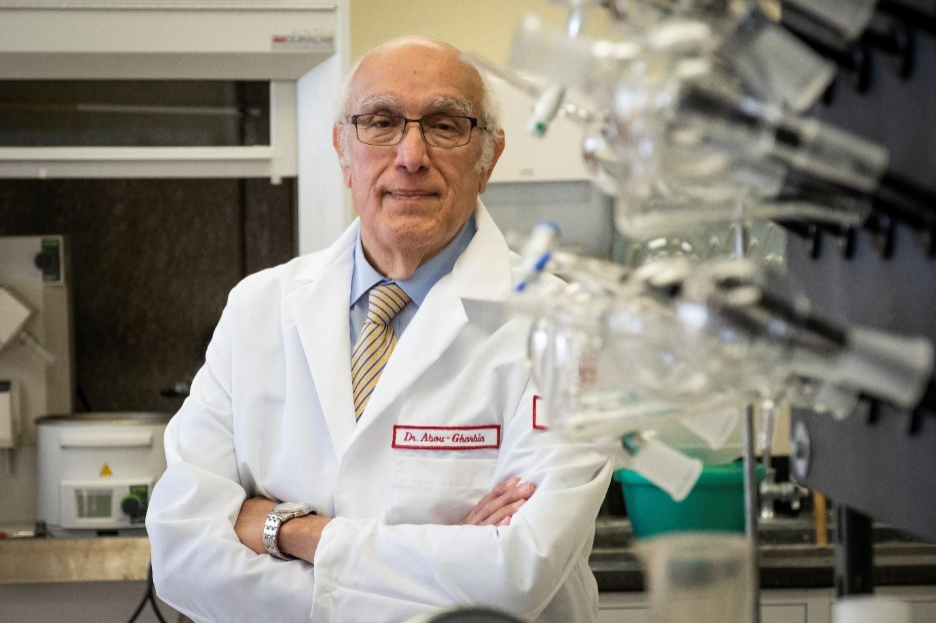Nestled in Temple’s Health Sciences Center is The Moulder Center for Drug Discovery Research, part of the university’s School of Pharmacy. Founded in 2008 by a gift from Lonnie and Sharon Moulder, over the years, its inaugural and continuing director, Professor Magid Abou-Gharbia has helped the center grow and flourish.
Since its founding, the center has received over $35 million in funding from grants and research contracts, published 180 publications and filed more than 30 patents. As Greater Philadelphia’s only fully integrated academic drug discovery, the center now includes 11 labs.
Abou-Gharbia, a pharmacist from Cairo University in Egypt, started his U.S. journey in Philadelphia with a scholarship from the University of Pennsylvania, where he received his Ph.D. After completing his doctorate, he did a National Institute of Health (NIH) postdoctoral fellowship. Afterwards, he spent most of his career in the pharmaceutical industry in drug discovery.
Eventually he became Wyeth’s (now Pfizer) senior vice president of Discovery Research, overseeing over 500 scientists in the U.S., 150 in India, 35 in China, and 30 in the UK. At Wyeth, his research team’s efforts led to the discovery of ten marketed drugs, including Effexor, an anti-depressant that modifies levels of serotonin and norepinephrine in the brain.
Since 2008, after more than 26 years at Wyeth, Abou-Gharbia came to Temple to spearhead, set, and implement the School of Pharmacy’s research strategies to promote their research and entrepreneurial enterprise. His efforts established Temple’s first drug discovery center, The Moulder Center.
“There is a good life after pharma.” In fact, he calls it “an even better life.”
– Magid Abou-Gharbia
Among his many achievements at Moulder, he has thrived working on the center’s crown jewel project which led to MC-10093, a drug candidate in progress that works to tackle addiction, especially cocaine addiction and alcoholism. Functioning as a glutamate transporter enhancer, MC-10093 modulates patients’ glutamate levels, ultimately reducing their desire to consume cocaine or alcohol. Now, after successful trials on rats and mice, the drug is moving on to advanced pre-clinical trials.
According to Abou-Gharbia, a lot of pharma researchers hesitate to enter academia because of the smaller budgets and the comparative lack of resources. For example, when he worked at Wyeth, Abou-Gharbia’s drug discovery budget was over $125 million, and at Temple it is much less, yet Abou-Gharbia has found success at Temple.
He finds training and mentoring of young scientists incredibly rewarding. And as a professor he can inspire and stimulate research, not only at Temple but around the globe. He has shared his research experience worldwide, from Toledo, Ohio to Paris, France. Over the years, he has welcomed several visiting scholars from Europe and the Middle East to join and train in his labs.
And as a professor, Abou-Gharbia has been able to make a positive impact on the lives of many of his students. For example, one of his former students who initially worked as a pharmacist at CVS, was offered a job at pharmaceutical company, Roche after Abou-Gharbia connected her with his former colleagues. Other PharmD students have joined the Federal Drug Administration.
“This [job] is much better to me than anything else,” he said.
-Magid Abou-Gharbia
Whether it be his work at the Moulder Institute or his time lecturing, Abou-Gharbia shows no signs of stopping any time soon. After decades in the field of Pharmaceutical Sciences and Drug Discovery, he has found his true calling at Temple University.
By Massin Larbi (CLA ’25), Global Engagement writing intern.
Photo courtesy of Magid Abou-Gharbia

